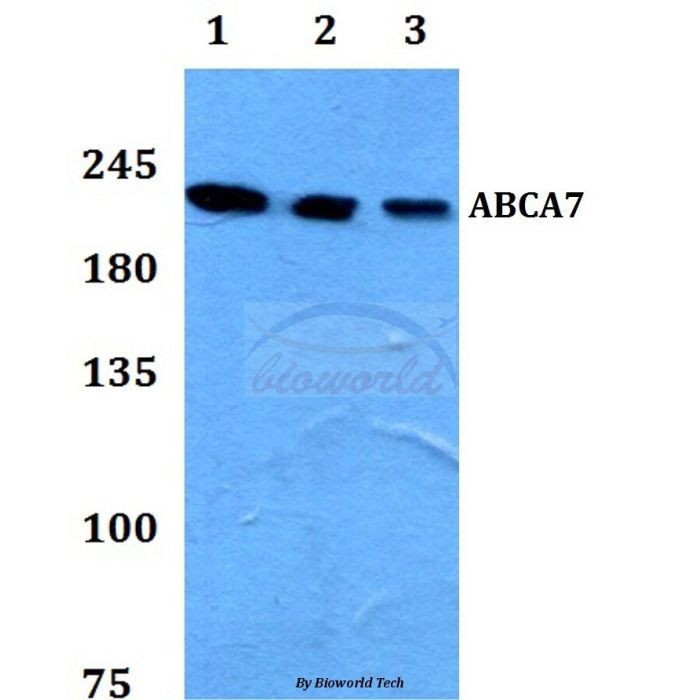ABCA7 polyclonal, anti-human, mouse, rat
€305.00
In stock
SKU
BS60108
Background:
ATP-binding cassette (ABC) transporters are an evolutionarily conserved family of widely-expressed proteins that use ATP hydrolysis to catalyze the transport of various molecules across extracellular and intracellular membranes. Eukaryotic ABC transporters are largely responsible for trafficking hydrophobic compounds either within the cell as part of a metabolic process, outside the cell for transport to other organs, or for secretion from the body. The cholesterol-responsive transporter, ABCA7, maps to human chromosome 19 and mouse chromosome 10 and has been reported as a candidate regulator of ceramide transport in epidermal lipid reorganization. High expression levels of ABCA7 have been reported in myelolymphatic tissues, reticuloendothelial cells, peripheral leukocytes, thymus, spleen and bone marrow. This expression pattern of the two alternatively-spliced isoforms also indicates an involvement in lipid homeostasis in cells of the immune system, though the complete role of ABCA7 is not yet known. Full-length type I ABCA7 has shown plasma membrane localization, while the type II splicing variant has shown expression predominantly in the endoplasmic reticulum.
Alternative Name:
ATP-binding cassette sub-family A member 7, ABCA-SSN, Autoantigen SS-N, Macrophage ABC transporter
Application Dilution: WB: 1:500~1:1000
Specificity: ABCA7 polyclonal antibody detects endogenous levels of ABCA7 protein.
Immunogen:
A synthetic peptide corresponding to residues in Human ABCA7.
MW: ~ 234 kDa
Swis Prot.: Q8IZY2
Purification & Purity:
The antibody was affinity-purified from rabbit antiserum by affinity-chromatography using epitope-specific immunogen and the purity is > 95% (by SDS-PAGE).
Format:
1mg/ml in PBS with 0.1% Sodium Azide, 50% Glycerol.
Storage:
Store at 4°C short term. Aliquot and store at -20°C long term. Avoid freeze-thaw cycles.
For research use only, not for use in diagnostic procedure.
ATP-binding cassette (ABC) transporters are an evolutionarily conserved family of widely-expressed proteins that use ATP hydrolysis to catalyze the transport of various molecules across extracellular and intracellular membranes. Eukaryotic ABC transporters are largely responsible for trafficking hydrophobic compounds either within the cell as part of a metabolic process, outside the cell for transport to other organs, or for secretion from the body. The cholesterol-responsive transporter, ABCA7, maps to human chromosome 19 and mouse chromosome 10 and has been reported as a candidate regulator of ceramide transport in epidermal lipid reorganization. High expression levels of ABCA7 have been reported in myelolymphatic tissues, reticuloendothelial cells, peripheral leukocytes, thymus, spleen and bone marrow. This expression pattern of the two alternatively-spliced isoforms also indicates an involvement in lipid homeostasis in cells of the immune system, though the complete role of ABCA7 is not yet known. Full-length type I ABCA7 has shown plasma membrane localization, while the type II splicing variant has shown expression predominantly in the endoplasmic reticulum.
Alternative Name:
ATP-binding cassette sub-family A member 7, ABCA-SSN, Autoantigen SS-N, Macrophage ABC transporter
Application Dilution: WB: 1:500~1:1000
Specificity: ABCA7 polyclonal antibody detects endogenous levels of ABCA7 protein.
Immunogen:
A synthetic peptide corresponding to residues in Human ABCA7.
MW: ~ 234 kDa
Swis Prot.: Q8IZY2
Purification & Purity:
The antibody was affinity-purified from rabbit antiserum by affinity-chromatography using epitope-specific immunogen and the purity is > 95% (by SDS-PAGE).
Format:
1mg/ml in PBS with 0.1% Sodium Azide, 50% Glycerol.
Storage:
Store at 4°C short term. Aliquot and store at -20°C long term. Avoid freeze-thaw cycles.
For research use only, not for use in diagnostic procedure.
| Is Featured? | No |
|---|
Write Your Own Review

